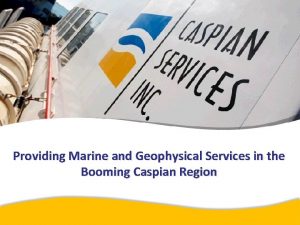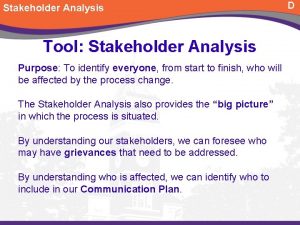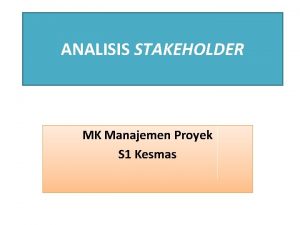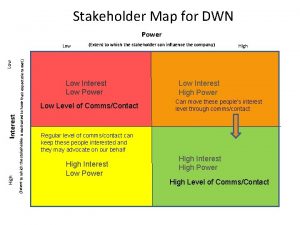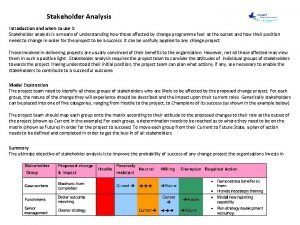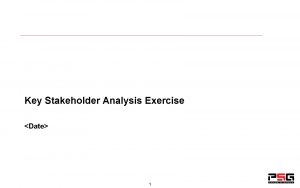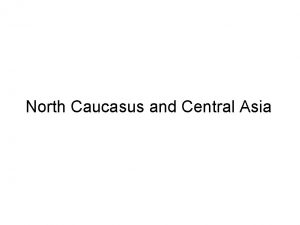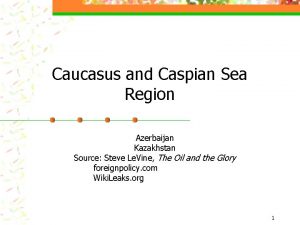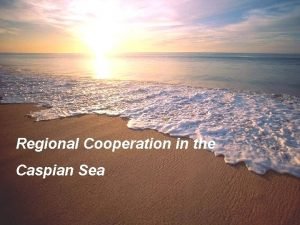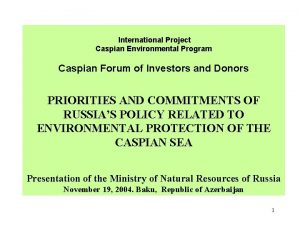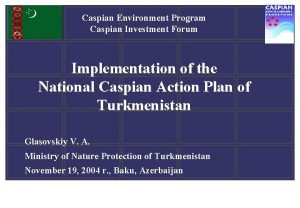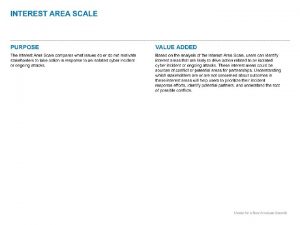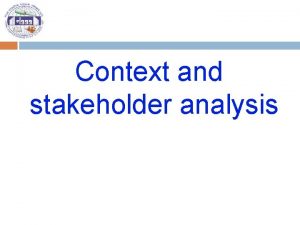Stakeholder Analysis in the Caspian and Caucasus Mary










- Slides: 10

Stakeholder Analysis in the Caspian and Caucasus Mary M. Matthews, Ph. D. Innovatia Consulting, Inc.

Overview of questions: l l l l What is a Stakeholder Analysis? What methodology is used? What difficulties were encountered? What solutions were found? What is the usefulness of the analysis? What are the advantages for IWRM? What are the lessons learned from the Caspian Environment Programme? Stakeholder Analysis revisited

What is Stakeholder Analysis? l Who are stakeholders? – – l Anyone with an interest, a “stake” in the conditions being addressed by the project Including anyone impacted by and impacting these conditions What is the objective of the SHA? – – – To identify the stakeholder groups To gauge their perceptions, interests and priorities To identify areas of tension between groups

What methodology is used? l l l l Literature review Qualitative/ground truthing Survey development and administration Database creation Statistical analysis, using mean and standard deviation among SHGs Identify areas of conflict between SHGs Make suggestions for overcoming conflicts/tensions both active and emergent Compare over time, using same questions

Difficulties encountered? Solutions found? 1. Lack of responsiveness from some sectors 1. More aggressive survey distribution, personal appeals with assurance of confidentiality 2. Not enough surveys to be “statistically valid” by social science criteria 2. Unfortunate, but due to low budgets unavoidable. Remember there is room for error, but this is better than nothing and can be quite informative. • Subsequent projects include mechanisms for stakeholder input throughout the TDA/SAP process span to provide feedback to the project through Stakeholder Advisory Groups (Create venues for stakeholder communications)

Usefulness of Analysis? l l Can identify the actual concerns among stakeholders Can provide a check on the experts in terms of top priority problems and perceptions Can allow projects to take steps to avoid future problems with the creation of win-win solutions CEP Example:

CEP: Priorities of Stakeholder Groups Stakeholder group All Stakeholders/ all respondents ( # priority) Fisheries Biodiversity #3 #2 Invasive species #5 Pollution Sustainable Development Civil Society #1 #4 #6 National NGO Nature Preserve Staff Coastal Zone Resident Public Healthcare Provider Educator/ Student Farmer / Water User Pastoralist/Animal Husbandry National or Local NGO Coastal Recreation Industry Community Based Organization Fishermen Fisheries Enforcement/ Border Guards Fishing Product Sales - National Fisheries Consumer and Value added consumers State Owned Industry Private Industry Oil Company Representatives National Press

Advantages for IWRM? l l l Provides a systematic view of complex issues with multiple stakeholder groups Allows solutions to be devised that focus on the high priority concerns of those impacting and impacted by IWRM Provides a baseline of analysis for future impacts of project, and informs how effectively the project is reaching it’s objectives

Lessons Learned for Caspian Environment Programme: l l l Importance of inclusion of multiple stakeholder input in TDA processes and project direction through SAP Ability to monitor trends over project timeframe Ability to gauge where public participation and stakeholder involvement is useful and appropriate, and is having an impact Provides feedback and direction for the development of the public participation strategy Serves as a case study for future projects in the region

Stakeholder Analysis Revisited l l l Can assist in the identification of involved groups Can assist in the identification of potential areas of conflict and suggest measures to avoid these conflicts for better programme effectiveness Provides a baseline of social data for future comparison, and project adjustment as needed
 Caspian marine services kazakhstan
Caspian marine services kazakhstan Stakeholder analysis fashion industry
Stakeholder analysis fashion industry Stakeholder analysis presentation
Stakeholder analysis presentation Stakeholder analysis
Stakeholder analysis Stakeholder analysis template
Stakeholder analysis template Stakeholder perusahaan
Stakeholder perusahaan Stakeholder analysis
Stakeholder analysis Stakeholder analysis exercise
Stakeholder analysis exercise Stakeholder analysis exercise
Stakeholder analysis exercise Mary wollstonecraft mary a fiction
Mary wollstonecraft mary a fiction Business and society ethics and stakeholder management
Business and society ethics and stakeholder management
